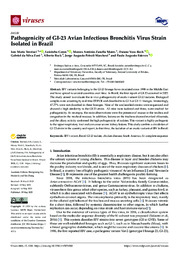Pathogenicity of GI-23 avian infectious bronchitis virus strain isolated in Brazil.
Pathogenicity of GI-23 avian infectious bronchitis virus strain isolated in Brazil.
Author(s): TREVISOL, I. M.; CARON, L.; MORES, M. A. Z.; RECH, D. V.; ZANI, G. da S; BACK, A.; MARCHESI, J. A. P.; ESTEVES, P. A.
Summary: Abstract: IBV variants belonging to the GI-23 lineage have circulated since 1998 in the Middle East and have spread to several countries over time. In Brazil, the first report of GI-23 occurred in 2022. The study aimed to evaluate the in vivo pathogenicity of exotic variant GI-23 isolates. Biological samples were screening by real-time RT-PCR and classified in to GI-1 or G1-11 lineages. Interestingly, 47.77% were not classified in these lineages. Nine of the unclassified strains were sequenced and showed a high similarity to the GI-23 strain. All nine were isolated and three, were studied for pathogenicity. At necropsy, the main observations were the presence of mucus in the trachea and congestion in the tracheal mucosa. In addition, lesions on the tracheas showed marked ciliostasis, and the ciliary activity confirmed the high pathogenicity of isolates. This variant is highly pathogenic to the upper respiratory tract and can cause severe kidney lesions. This study confirm a circulation of GI-23 strain in the country and report, to first time, the isolation of an exotic variant of IBV in Brazil.
Publication year: 2023
Types of publication: Journal article
Unit: Embrapa Swine & Poultry
Observation
Some of Embrapa's publications are published as ePub files. To read them, use or download one of the following free software options to your computer or mobile device. Android: Google Play Books; IOS: iBooks; Windows and Linux: Calibre.
Access other publications
Access the Agricultural Research Database (BDPA) to consult Embrapa's full library collection and records.
Visit Embrapa Bookstore to purchase books and other publications sold by Embrapa.

